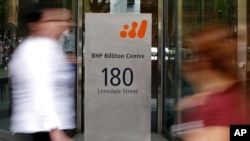A census is revealing how immigration from Asia and the boom in mining are reshaping modern Australia. The census data indicates the country is becoming increasingly multicultural.
According to census data compiled last year by the Australian Bureau of Statistics, nearly 22 million people now reside in Australia. But behind the population statistics lies a portrait of a growing multicultural society influenced by a rise in immigration and the development of new economic centers.
The census shows how Australia’s mining bonanza is reshaping the way the nation lives. More people are moving to the boom states of Western Australia and Queensland in search of work in the resources industry, which is powered by exports of iron ore and coal, mostly to Asia.
The sector has helped Australians become richer, own more cars and live in larger homes during a period of global financial crises.
The data also highlights Asia's growing influence. More migrants are coming from India and China, which is Australia's biggest trading partner. The census reflects the shift in those economic and social ties. After English, Mandarin Chinese has replaced Italian as the most common language spoken in Australian homes.
Victor Dominello, the New South Wales minister for citizenship and multiculturalism, says the country is becoming increasingly diverse.
"There is obviously a broad spectrum of views in Australia, as there is around the world, in relation to multiculturalism, but Australia is one of the those countries where in our state alone one in every four people were born overseas," said Dominello. "In our state alone 40 percent have at least one parent born overseas. Now I'm one of those statistics: both of my parents were born in Italy. The reality is, though, when we talk about multiculturalism we must frame multiculturalism within the Australian way of life - that is, within the Australian laws, within the Australian values."
Migration from India has made Hinduism the fastest growing religion in Australia. While there has been a 40 percent increase in the number of Australians identifying themselves as Islamic in faith, a record number of citizens say they practice no religion at all.
Australia, a former British penal colony, has seen its population jump by more than 17 million over the past century. The current population stands at 21.7 million, an 8.3 percent increase from the 2006 census.
The census information is used to help shape government policies and spending.
According to census data compiled last year by the Australian Bureau of Statistics, nearly 22 million people now reside in Australia. But behind the population statistics lies a portrait of a growing multicultural society influenced by a rise in immigration and the development of new economic centers.
The census shows how Australia’s mining bonanza is reshaping the way the nation lives. More people are moving to the boom states of Western Australia and Queensland in search of work in the resources industry, which is powered by exports of iron ore and coal, mostly to Asia.
The sector has helped Australians become richer, own more cars and live in larger homes during a period of global financial crises.
The data also highlights Asia's growing influence. More migrants are coming from India and China, which is Australia's biggest trading partner. The census reflects the shift in those economic and social ties. After English, Mandarin Chinese has replaced Italian as the most common language spoken in Australian homes.
Victor Dominello, the New South Wales minister for citizenship and multiculturalism, says the country is becoming increasingly diverse.
"There is obviously a broad spectrum of views in Australia, as there is around the world, in relation to multiculturalism, but Australia is one of the those countries where in our state alone one in every four people were born overseas," said Dominello. "In our state alone 40 percent have at least one parent born overseas. Now I'm one of those statistics: both of my parents were born in Italy. The reality is, though, when we talk about multiculturalism we must frame multiculturalism within the Australian way of life - that is, within the Australian laws, within the Australian values."
Migration from India has made Hinduism the fastest growing religion in Australia. While there has been a 40 percent increase in the number of Australians identifying themselves as Islamic in faith, a record number of citizens say they practice no religion at all.
Australia, a former British penal colony, has seen its population jump by more than 17 million over the past century. The current population stands at 21.7 million, an 8.3 percent increase from the 2006 census.
The census information is used to help shape government policies and spending.






